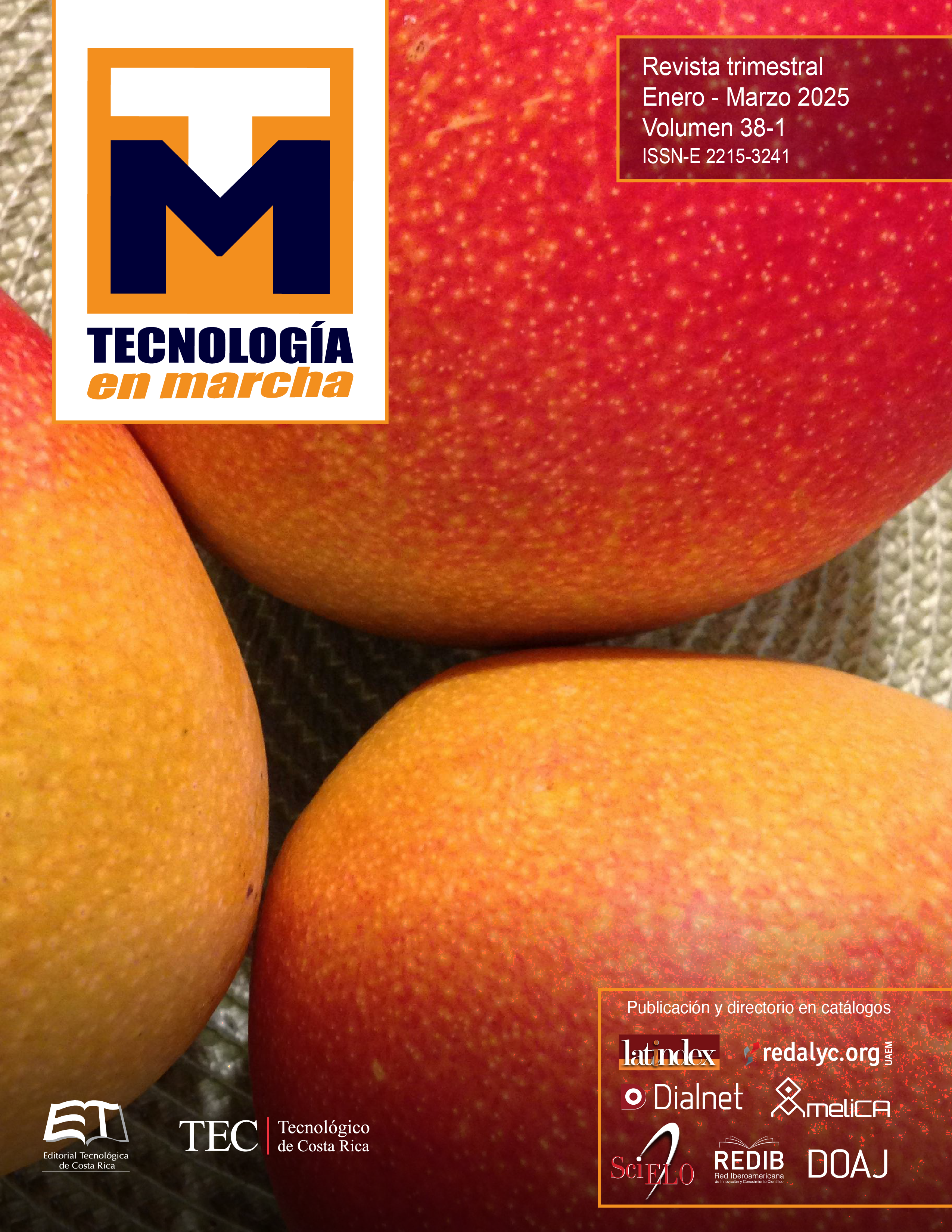Reuse of Lithium Batteries: A Comprehensive Study on Opportunities, Regulations, and Perspectives in Germany and Costa Rica
Main Article Content
Abstract
This research project places a strong emphasis on the reuse of lithium-ion batteries as a central element in the transition to carbon neutral energy. The technical, legal and financial aspects of these processes in Germany are described in detail to provide a comprehensive understanding of the reuse and recycling practices of lithium batteries. Special attention is given to the reuse of large batteries, with concrete examples of the situation in Germany. Potentials and challenges related to smaller batteries are also addressed, pointing out that in Germany the reuse of lithium-ion batteries from small devices does not seem to be economically profitable. A significant contribution of this paper is the presentation of the German approach as an inspiring model for developing countries such as Costa Rica. It highlights the possibility of applying these processes on a smaller scale, especially for smaller devices. The idea is that the German approach can serve as a guideline for the sustainable use of lithium-ion batteries in countries that are still in the development phase. In summary, this project contributes to raising awareness of the importance of reusing lithium-ion batteries in the context of the energy transition and presents concrete examples as well as possible applications for developing countries, thus contributing to global sustainability.
Article Details

This work is licensed under a Creative Commons Attribution-NonCommercial-NoDerivatives 4.0 International License.
Los autores conservan los derechos de autor y ceden a la revista el derecho de la primera publicación y pueda editarlo, reproducirlo, distribuirlo, exhibirlo y comunicarlo en el país y en el extranjero mediante medios impresos y electrónicos. Asimismo, asumen el compromiso sobre cualquier litigio o reclamación relacionada con derechos de propiedad intelectual, exonerando de responsabilidad a la Editorial Tecnológica de Costa Rica. Además, se establece que los autores pueden realizar otros acuerdos contractuales independientes y adicionales para la distribución no exclusiva de la versión del artículo publicado en esta revista (p. ej., incluirlo en un repositorio institucional o publicarlo en un libro) siempre que indiquen claramente que el trabajo se publicó por primera vez en esta revista.
References
M. Atzorn, C. Gey, F. Leplow und M. Piayda, „Wiederverwendung und Recycling von Lithium-Ionen-Akkus,“ Hochschule RheinMain, Wisbaden Rüsselsheim, 2018.
J. Broich, „Das zweite Leben der Lithium-Ionen-Batterien,“ 22 06 2022. [Online]. Available: https://www.energiezukunft.eu/wirtschaft/das-zweite-leben-der-lithium-ionen-batterien/. [Zugriff am 17 09 2023].
B. d. Justiz, „Erneuerbare-Energien-Gesetz (EEG),“ 2023. [Online]. Available: https://www.gesetze-im-internet.de/eeg_2014/__1.html. [Zugriff am 17 09 2023].
S. Fischhaber, A. Regett und S. F. Schuster, „Studie: Second-Life-Konzepte für Lithium-Ionen-Batterien aus Elektrofahrzeugen,“ Begleit- und Wirkungsforschung Schaufenster Elektromobilität (BuW), Frankfurt am Main, 2016.
L. C. Casals, B. Amante García und L. V. Cremades, „Electric vehicle battery reuse: Preparing for a second life,“ in Journal of Industrial Engineering and Management, Catalunya, Universidad Politécnica de Catalunya, 2017, pp. 271 - 273.
Hesselmann, „Das Batteriegesetz,“ 2023. [Online]. Available: https://www.batteriegesetz.de/#gesetz_60. [Zugriff am 18 09 2023].
B. d. Justiz, „Batteriegesetz (BattG),“ 2021. [Online]. Available: https://www.gesetze-im-internet.de/battg/inhalts_bersicht.html. [Zugriff am 17 09 2023].
A. Seeger, „EU-Batterieverordnung stellt neue Anforderungen an die Industrie,“ STENA Recycling, 2023. [Online]. Available: https://www.stenarecycling.com/de/news-einblicke/einblicke--inspirationen/leitfaeden-artikel/eu-batterierverordnung-stellt-neue-anforderungen-an-die-industrie/#:~:text=Derzeit%20m%C3%BCssen%20mindestens%2050%20%25%20des,und%20Bleigehalt%20von%20Batterien%. [Zugriff am 18 09 2023].
S. Hartmann, „Deutschland ist in Europa Vorreiter bei Recyclinganlagen für Lithium-Ionen-Batterien,“ Euwid, 24 05 2022. [Online]. Available: https://www.euwid-recycling.de/news/wirtschaft/deutschland-in-europa-vorreiter-bei-recyclinganlagen-fuer-lithium-ionen-batterien-240522/. [Zugriff am 22 09 2023].
T. Weber, „Battery Pass - Umsetzung einer neuen Generation digitaler Produkthandhabung,“ CicularEconomyInitiative, 2023. [Online]. Available: https://www.circular-economy-initiative.de/battery-pass-de. [Zugriff am 22 09 2023].
„Voltfang,“ 2023. [Online]. Available: https://voltfang.de/batteriespeicher-industrie/batteriegrossspeicher/. [Zugriff am 19 09 2023].
M. Kaiser, W. Gomoll und S. Grundhoff, „Wiederverwendung von alten E-Auto-Akkus: Stadionbeleuchtung, Haus-Stromspeicher,“ EFahrer, 15 03 2021. [Online]. Available: https://efahrer.chip.de/news/wiederverwendung-von-alten-e-auto-akkus-stadionbeleuchtung-haus-stromspeicher_104330. [Zugriff am 19 09 2023].
J. Wegener, „Upcycling: Lithium-Ionen-Akkus testen und wiederverwenden,“ 10 05 2021. [Online]. Available: https://www.heise.de/ratgeber/Upcycling-Lithium-Ionen-Akkus-testen-und-wiederverwenden-6033384.html. [Zugriff am 30 10 2023].
E. Kommission, „REGULATION (EU) 2023/1542 OF THE EUROPEAN PARLIAMENT AND OF THE COUNCIL,“ 12 07 2023. [Online]. Available: https://eur-lex.europa.eu/eli/reg/2023/1542/oj. [Zugriff am 30 10 2023].
Umweltbundesamt, „Altbatterien - Im Jahr 2022 hat Deutschland alle von der EU geforderten Mindestziele erreicht,“ 23 10 2023. [Online]. Available: https://www.umweltbundesamt.de/daten/ressourcen-abfall/verwertung-entsorgung-ausgewaehlter-abfallarten/altbatterien#im-jahr-2022-hat-deutschland-alle-von-der-eu-geforderten-mindestziele-erreicht. [Zugriff am 30 10 2023].

